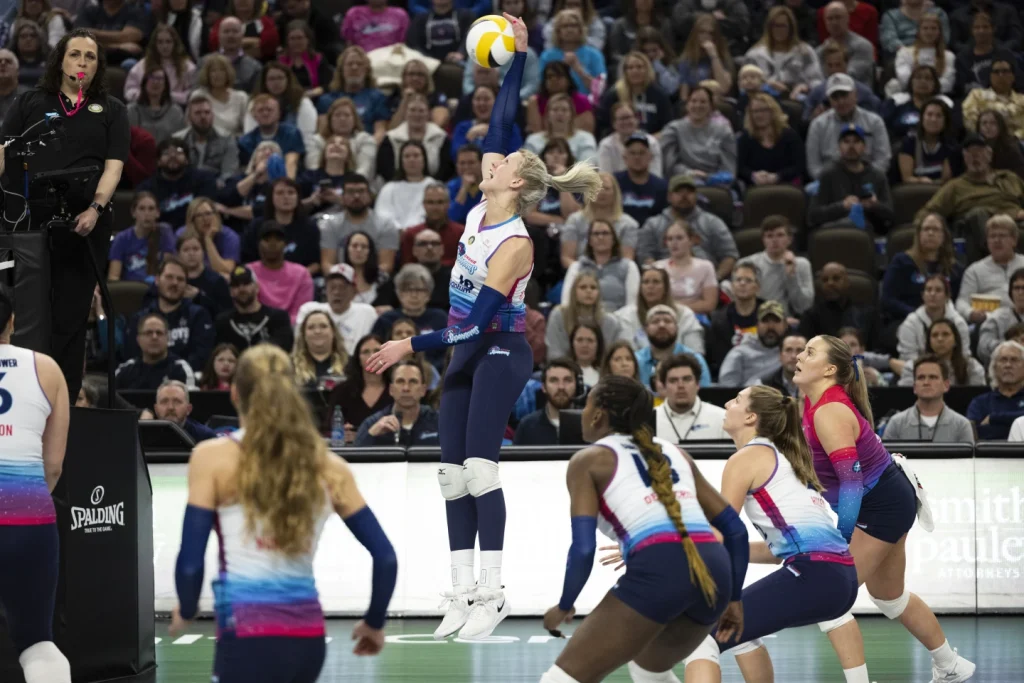Volleyball has undoubtedly become a prominent and widely popular sport among girls in the United States, maintaining its position as the top sport for female participation for nearly a decade.
The tremendous support for the sport was evident last summer when over 90,000 fans flocked to Nebraska’s football stadium for an outdoor match, and the NCAA semifinal and championship matches broke attendance and television viewership records.
The sport’s continued growth and evolution were further highlighted with the debut of the Pro Volleyball Federation, as the Atlanta Vibe faced off against the Omaha Supernovas.
This marks a significant milestone for women’s volleyball in the United States, as it provides players with professional opportunities that were previously limited, forcing them to seek career opportunities overseas.
The establishment of the PVF, along with the upcoming launch of League One Volleyball and the success of the Athletes Unlimited league, demonstrates the increasing recognition and support for women’s volleyball in the country.
These developments signify a promising future for the sport, offering female athletes the chance to pursue their careers domestically and contribute to the continued growth and success of volleyball in the United States.
Tori Dixon, the 31-year-old middle blocker for the Supernovas, boasts an impressive professional career spanning seven seasons, during which she has showcased her talents in Azerbaijan, Japan, Italy, and China.
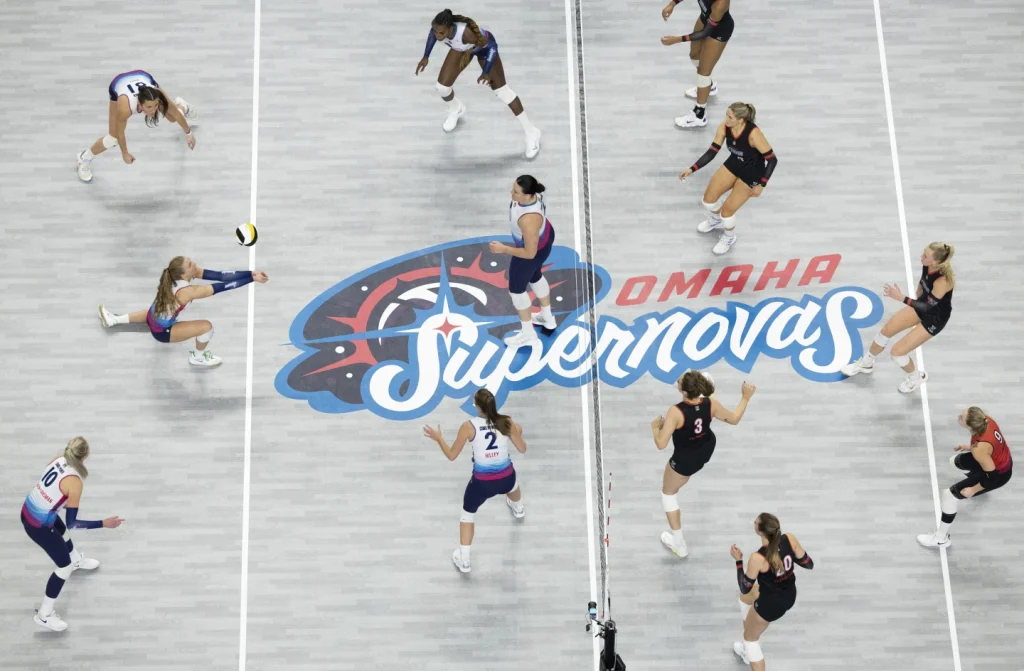
Her experience has garnered international attention for the Premier Volleyball Federation (PVF), with former teammates reaching out to her for assistance in securing contracts.
Dixon highlighted the appeal of playing domestically, emphasizing the comfort and stability it offers despite potentially lower financial rewards compared to overseas opportunities.
She emphasized the arduous nature of competing abroad, suggesting that many elite players are opting to remain in the United States.
Notably, the PVF’s reach extends beyond Atlanta and Omaha, with teams also located in Columbus, Las Vegas, Orlando, San Diego, and Grand Rapids, Michigan.
This expansion underscores the league’s growing presence and the increasing allure of domestic volleyball for top-tier athletes.
The inaugural night proved to be a resounding success for the PVF officials, as a substantial crowd of 11,624 gathered at the CHI Health Center.
The evening culminated in a gripping five-set match, ultimately clinched by the Vibe. Throughout the event, the fans remained fervent and engaged, spurred on by the arena’s master of ceremonies, musical interludes, and the display of high-caliber athleticism.
Omaha coach Shelton Collier aptly summarized the occasion, remarking, “This was breaking ground for a professional volleyball league, and there could have been 800 people and a poorly played match.
It was an incredible match with an incredible crowd, an incredible atmosphere, incredible support staff.
Whoever put on this production for the fans, it was amazing. It was epic.” Notably, the PVF boasts a distinguished roster of team owners, including Cincinnati Bengals quarterback Joe Burrow, Orlando Magic chairman Dan DeVos, three-time Olympic beach volleyball gold medalist Kerri Walsh Jennings, and multi-platinum recording artist Jason Derulo.
Furthermore, the league has garnered support from prominent figures such as basketball luminaries Candace Parker, Jayson Tatum, and Kevin Durant, tennis legend Billie Jean King, skiing sensation Lindsey Vonn, as well as entertainers Amy Schumer and Chelsea Handler.
LOVB’s franchises, owned by the league, have already been unveiled in Atlanta, Houston, Omaha, Salt Lake City, and Madison, Wisconsin.
The successful launch of this new professional volleyball league signals a promising future for the sport and hints at the potential for further expansion and growth.
The Athletes Unlimited league, co-founded by Jon Patricof and Jonathan Soros, has garnered attention for its innovative approach to professional sports.
The league’s five-week season, played at a single site, features 44 players who rotate among four teams on a weekly basis, ensuring a dynamic and competitive environment. Notably, players are guaranteed a minimum payment of $10,000, reflecting a commitment to fair compensation.
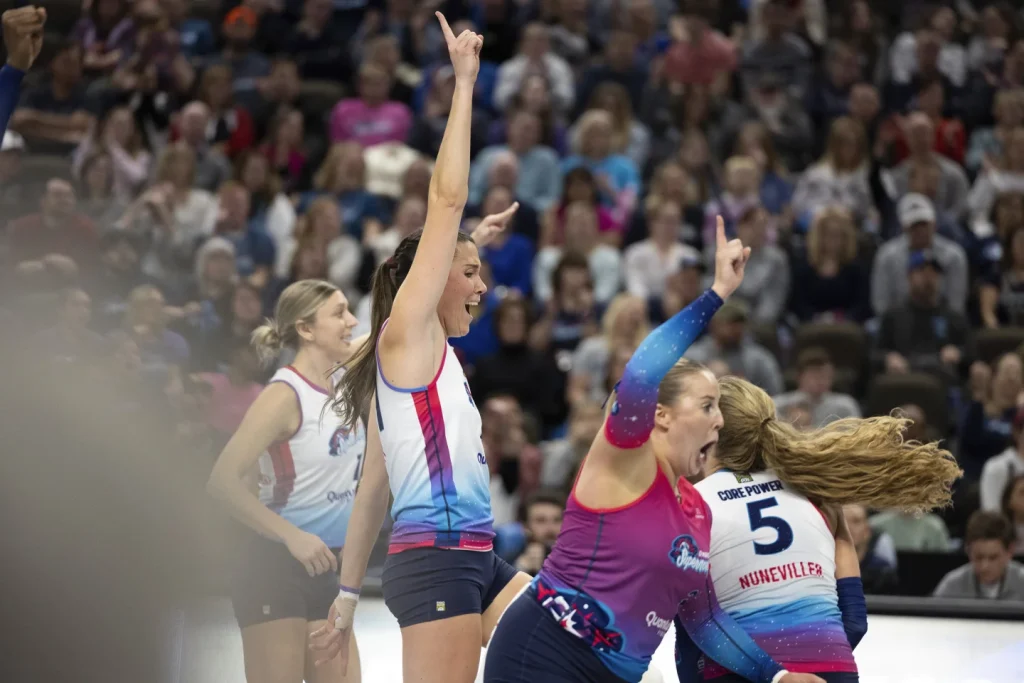
Additionally, PVF players are contracted for a 24-match regular season and playoffs, with a substantial salary of $60,000, complemented by bonuses for outstanding individual and team performances.
The league’s emphasis on revenue sharing and a promising $1 million championship prize further underscores its dedication to rewarding excellence.
Housing and other benefits are provided, with two players from each roster serving as year-round ambassadors for their respective teams, receiving an additional $40,000.
However, details regarding the pay structure and schedule of the LOVB league remain undisclosed. This highlights the disparity in earnings for professional athletes, with potential for substantial income overseas for top-tier players, while many others receive comparatively modest compensation, and some face irregular payment schedules.
The administration of the league is under the leadership of CEO Jen Spicher, an experienced business executive with a background as a former college player and club coach.
The vice president of operations, Cecile Reynaud, is a former Florida State coach, while Laurie Corbelli, a former Texas A&M coach, serves as the operations consultant.
Additionally, Logan Tom, a four-time U.S. Olympian, holds the position of director of international development and player strategy.
The timing of the league’s inception is noteworthy, as the sport gained global attention in August with the largest documented crowd for a women’s sporting event, drawing 92,003 spectators to witness perennial college power Nebraska play Omaha at Memorial Stadium in Lincoln.
The NCAA final four in Tampa, Florida, also garnered significant attendance, with over 19,000 spectators on each of the two nights. The championship match, televised on ABC for the first time, attracted 1.7 million viewers.
CBS Sports Network has secured the rights to televise at least 10 PVF regular-season matches, along with coverage of the playoffs. Furthermore, the PVF has established streaming agreements with Bally Sports and Stadium.
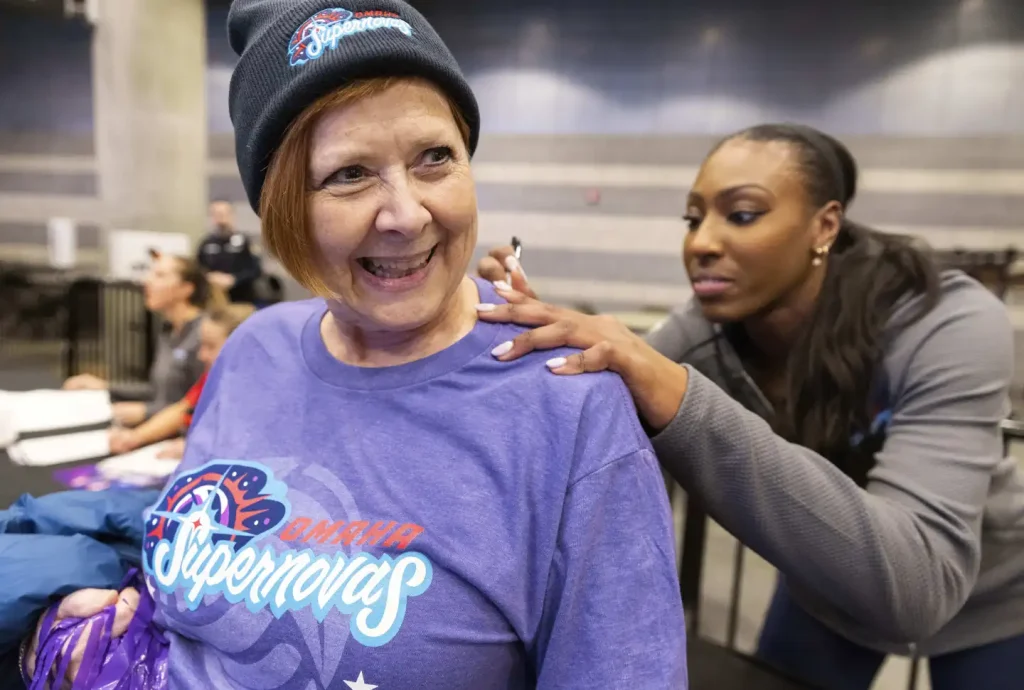
In contrast to a more traditional structure, each LOVB team is associated with a junior volleyball club in its market, where professional players train alongside club players and engage in various activities.
CEO Katlyn Gao highlighted the league’s unique approach, stating, “Most leagues start kind of top down, if you will. They start with pro (team) and then do programs with local youth clubs.
What we saw as an opportunity was how vibrant and expansive the network of youth volleyball there already is at the club level, so we’ve asked these clubs to join us.”
The establishment of a professional volleyball league in the United States has historical context, with the most significant previous attempt being Major League Volleyball in the 1980s.
Despite initial promise, the league folded due to financial reasons a month into its third season in 1989.
Laurie Corbelli, an ’84 Olympian who played in MLV, expressed confidence in the current landscape, acknowledging the differences between Athletes Unlimited’s structure and short season and the PVF and LOVB. The question remains whether one or both leagues can survive long-term, potentially leading to a merger.
Corbelli reflected on the challenges, noting, “The hardest part for me is all these volleyball people are a family. We all know each other. There’s no animosity.
It’s just hard because we’re going to go head-to-head for players and cities. It’s going to have to happen until one league…”
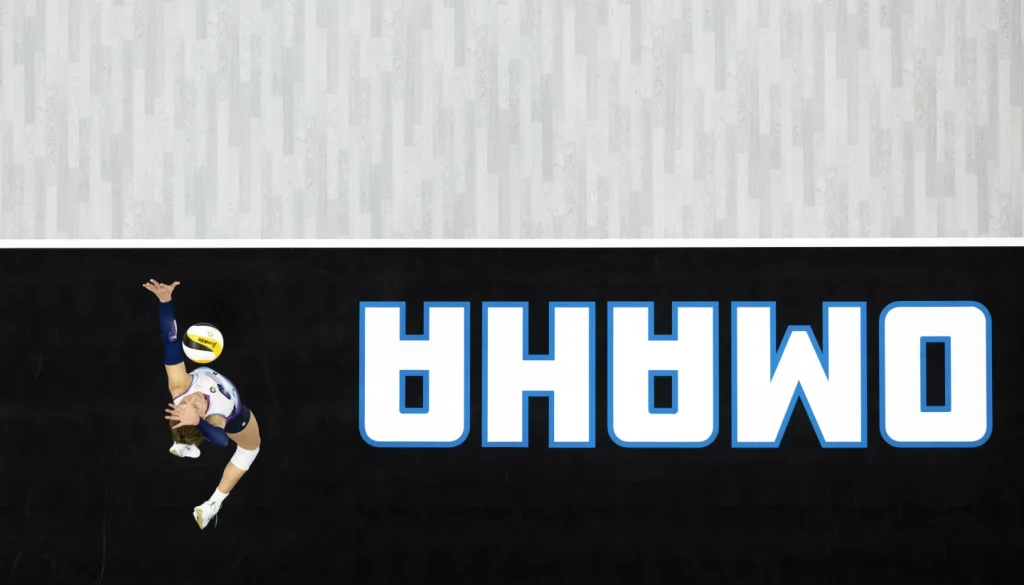
She expressed uncertainty about the sustainability of the current situation, emphasizing the potential benefits of having one strong, unified league.
As the league looks to the future, the desire to create a single, robust league is evident, with both the PVF and LOVB striving to achieve this goal.
The ultimate aim is to establish a sustainable and successful platform for professional women’s volleyball in the United States.

